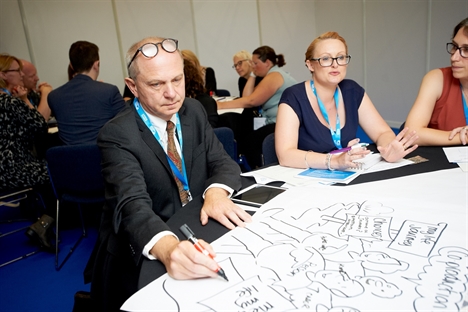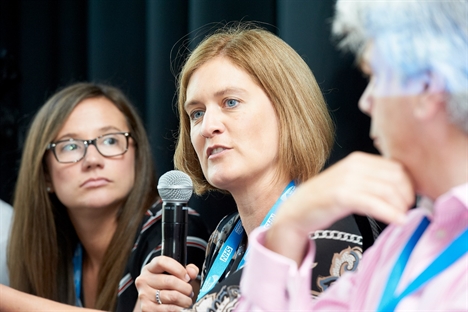13.09.16
NHS Expo review: change is coming
Source: NHE Sep/Oct 16
David Stevenson, Rosemary Collins and Luana Salles report from this year’s Health and Care Innovation Expo, which was held at Manchester Central from 7-8 September.
This year’s Expo set the scene for a changing landscape across the NHS, from health devolution to the realignment of the IT implementation programme. Attended by record-breaking numbers of delegates, according to NHS England officials, the two-day conference was jam-packed with keynotes, debates, pop-up universities and numerous satellite events.
On the first morning, NHS England’s chief financial officer Paul Baumann, Sir Howard Bernstein, chief executive of Manchester City Council, and Jon Rouse, chief officer for Greater Manchester Health and Social Care Devolution, discussed the progress of the ‘DevoManc’ project.
During the lively session on the Future Stage, Rouse and Sir Howard stressed that the successful creation of formal partnerships to deliver devolved services in Greater Manchester owes much to a history of collaboration and shared objectives in the city.
But Rouse noted that, despite the early successes, Greater Manchester devolution will need to be ultimately judged by improvements in patient experience and outcomes – particularly in the key clinical priority areas of cancer, mental health and learning disabilities. Baumann was keen to point out that devolution is not an end in itself and would “not be a free for all”.
Making IT Work
Over at the event’s Innovate Stage, Dr Robert Wachter ran through the findings of his ‘Making IT Work’ report , which concluded that for the NHS to continue providing a high level of healthcare at an affordable cost, it “simply must modernise and transform”.
Nicknamed the ‘digital doctor’, Dr Wachter called for a phased implementation of NHS digitisation, which would be complete by 2023 rather than 2020 – as the “aspirational goal”, with the money and time available, was likely to fail in a similar way to the ambitious National Programme for Information Technology.
“Transformational change is mostly good, although challenging,” he said. “That is why it is so important you get digitisation done – and done properly – to link up all the pieces of the system. That doesn’t get the job done, but it creates the scaffolding for enormous transformation.
“The technology needs to get better, and the key is that the work needs to be reimagined. You have to have the people who can evolve the IT system. There also needs to be some tolerance for the messy early days of IT implementation.”
Getting the right people in place
To ensure the right people are in place, health secretary Jeremy Hunt announced that an NHS Digital Academy would be established (more on page 61); he named the 12 global exemplar sites to pioneer best practice and the use of technology across the NHS ; and outlined plans to push forward patient self-diagnosis, including the expansion of the existing NHS 111 non-emergency phone line service to include a new online ‘triage’ service for less serious health problems.
“Our objective is to bring everyone up to the standard of the very best by 2023 as Bob recommends,” said Hunt. “We are also moving towards greater self-diagnosis, as we are going to have a new online resource for patients.” However, he stated that this is never about replacing the role or the expertise of the doctor or nurse.
Also, by March next year, NHS England is going to publish a library of approved apps in areas like mental health and diabetes, he added.

STPs to be the driver of change
Mark Swindells, NHS England’s national director for operations and information, said that sustainability and transformation plans (STPs) must have technology embedded in them and will be the vehicle to drive change locally.
“We’ve created the STPs to be the vehicle of that change, to be able to drive that locally and not create a number of top-down changes that are the same everywhere,” he said, adding that we need to create a bottom-up approach with STPs evolving a new set of models of care that are thinking about whole system design across health and social care.
During his keynote speech, NHS England CEO Simon Stevens reiterated that the STPs, which have come under recent criticism, are “vital” to delivering joined-up care.
He said the conversation around STPs was “precisely about addressing this kind of linkage in all parts of the country” by helping the weakest part of a health system catch up with the others. Speaking about NHS digitisation, following the Wachter Review’s publication, Stevens reiterated that IT must be implemented with care to avoid a “trough of disillusionment” when it fails to live up to hype.
“We have got to get digitisation right,” he said. “That doesn’t mean doing it fast.”

Kate Granger Compassionate Care Awards
At the end of the first day, the third edition of the Kate Granger Compassionate Care Awards, which are given to individuals, teams and organisations who demonstrate outstanding care for their patients, took place.
Kate Granger, the terminally ill doctor who worked tirelessly to raise awareness around compassion in the NHS through her #hellomynameis social media campaign, chose the winners for this year’s awards shortly before she died on 23 July from a rare type of sarcoma.
Mental health mindfulness
A session that attracted much attention during the show was when comedian and mental health campaigner Ruby Wax took to the stage.
“When you have depression you want to show the world you’re perfectly fine,” she told the audience. “It’s the thinking about stress that really makes you ill. It was a combination of medication and meditation that worked for me. If you can do something on your own a little bit then it gives you a little bit of power.”
Wax also announced a new Frazzled Café project she is now running to help people with mental ill health get together and meet other people.
Data and patient trust
At the same time as the session with Wax, the National Data Guardian, Dame Fiona Caldicott, discussed the findings of her recent review into data security standards and opt-outs (covered in NHE July/August 2016). She explained that the complexity of attempting to develop a single opt-out for patients was “extremely challenging”, and around 600 people had responded to the consultation which was run after the report’s publication.
“We asked the public what the model should look like, whether it should be one or two questions. About half the responses have been from the public, which has been really helpful,” she said. “Our recommendation is that whatever is decided about the model it should then be respected across all organisations. We shouldn’t have a multiplicity of different variants.”
Dame Fiona noted, once again, that the main theme is about becoming trustworthy. She did emphasise, however, that as yet “nothing has changed” with regards to opt-outs in the system or are going to be changed by her report. She said the challenge will come when a decision on whether to take forward the model needs to be made, and ensuring patients are involved with the conversation.
Urgent and emergency care vision
During a session on the future of urgent and emergency care, which was hosted by Professor Keith Willett, an esteemed panel looked at the changes taking place in primary care, mental health, technology and social care to deliver an integrated urgent and emergency care system.
NHS England’s national clinical director for mental health, Professor Tim Kendall, highlighted, for instance, that by 2021 all crisis and home treatment teams across the country will operate 24/7, and have a maximum four-hour crisis response.
“Over the next four years we are expecting about £4bn to be invested in mental health,” he said. “Now that is not enough, even at the Public Accounts Committee Simon Stevens acknowledged this was the case, but it is a jolly good start.”
Sharon Blackburn CBE, policy and communications director at the national Care Forum, highlighted the importance of thinking locally and acting personally in health and social care.
But she warned: “Typically we only talk to ourselves and don’t look over the fence. STPs are a wonderful idea, but I don’t know how many of you have had your social care partners around the table?
“We need to get out of our silos and talk to each other. We are our own problem as we are not prepared to be the change we need. The real story will be around the person telling us they are included and consulted and are partners in health and social care.”
Greater nurse involvement
Professor Jane Cummings, the chief nursing officer, said that there is no point having STPs or vanguards that provide a few GPs or a few managers or a few commissioners.
“It has to be the professional workforce that leads and drives that change,” she said. “I want to see nurses in STPs day in day out actually leading that and supporting new ways of working.”
Prof Cummings admitted that she had received “mixed responses” to the idea that nurses need to play a bigger role in STPs, but she urged healthcare professionals that “if you haven’t got them, go out and get them”.
Performance change
On the last day of Expo, the performance figures for July 2016 were released and showed that of the two million attendances at A&E during the month, a 6.3% increase on the previous year, only 90.3% of patients were admitted, transferred or discharged within four hours. The target for this key performance measure is 95%, which the NHS has now not met in over a year.
But Professor Jonathan Benger, national clinical director of urgent and emergency care at NHS England, unveiled a new set of measures on the performance of a whole healthcare system from next year.
He criticised the current standard, saying: “There comes a point where we have to ask whether we are now hitting the target but missing the point, or, in this country now, missing the target but missing the point.”
After two years of work, Professor Benger’s team have developed standards based on three main areas: clinical pathways, patient experience and staff experience. The measures have been piloted in a number of areas and are due to be introduced across the NHS in 2017.
It is fair to say that the key message to take away from this year’s NHS Expo is that change, in whatever form, is on its way for institutions, models of working and the workforce.
Tell us what you think – have your say below or email [email protected]